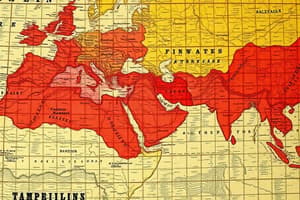Podcast
Questions and Answers
What were the different types of territories that made up the British Empire?
What were the different types of territories that made up the British Empire?
- Colonies, dominions, mandates, and other territories
- Colonies, protectorates, dominions, and territories
- Colonies, protectorates, mandates, and other territories (correct)
- Colonies, protectorates, dominions, and mandates
During which period did Britain achieve its dominance, which is known as Pax Britannica?
During which period did Britain achieve its dominance, which is known as Pax Britannica?
- 1939-1945
- 1815-1914 (correct)
- 1945-1960
- 1914-1939
What percentage of the world population did the British Empire hold sway over at its height in the 19th and early 20th century?
What percentage of the world population did the British Empire hold sway over at its height in the 19th and early 20th century?
- 23% (correct)
- 15%
- 40%
- 30%
What was the major cause of the First World War, during which Britain relied heavily on its empire?
What was the major cause of the First World War, during which Britain relied heavily on its empire?
Which country occupied Britain's colonies in East Asia and Southeast Asia during the Second World War, accelerating the decline of the empire?
Which country occupied Britain's colonies in East Asia and Southeast Asia during the Second World War, accelerating the decline of the empire?
Which event confirmed Britain's decline as a global power?
Which event confirmed Britain's decline as a global power?
When did India achieve independence from the British Empire as part of a larger decolonization movement?
When did India achieve independence from the British Empire as part of a larger decolonization movement?
Flashcards
British Colonies
British Colonies
Territories directly ruled by Britain, with British laws and administration.
British Protectorates
British Protectorates
Territories with local rulers but under British protection, guided by treaties.
British Mandates
British Mandates
Territories granted to Britain by the League of Nations after World War I.
Pax Britannica
Pax Britannica
Signup and view all the flashcards
Military & Economic Rivalry
Military & Economic Rivalry
Signup and view all the flashcards
Suez Crisis of 1956
Suez Crisis of 1956
Signup and view all the flashcards
Decolonization
Decolonization
Signup and view all the flashcards
Study Notes
The Rise and Fall of the British Empire
- The British Empire was composed of dominions, colonies, protectorates, mandates, and other territories ruled or administered by the United Kingdom and its predecessor states.
- It began with overseas possessions and trading posts established by England in the late 16th and early 17th centuries.
- At its height in the 19th and early 20th century, the British Empire was the largest empire in history and the foremost global power, holding sway over 23% of the world population and covering 24% of the Earth's total land area.
- The British Empire's constitutional, legal, linguistic, and cultural legacy is widespread.
- Britain's dominance was achieved during a period of relative peace (1815-1914) known as Pax Britannica.
- The empire's dominance of much of world trade meant that it effectively controlled the economies of many regions, such as Asia and Latin America.
- Military and economic tensions between Britain and Germany were major causes of the First World War, during which Britain relied heavily on its empire.
- The Second World War saw Britain's colonies in East Asia and Southeast Asia occupied by the Empire of Japan, accelerating the decline of the empire.
- India, the most valuable and populous possession of the British Empire, achieved independence in 1947 as part of a larger decolonization movement.
- The Suez Crisis of 1956 confirmed Britain's decline as a global power.
- The accelerating pace of decolonization resulted in the abolition of the Colonial Office in 1966 and its absorption into the Foreign and Commonwealth Office in October 1968.
- The transfer of Hong Kong to China on 1 July 1997 symbolized for many the end of the British Empire.
Studying That Suits You
Use AI to generate personalized quizzes and flashcards to suit your learning preferences.




